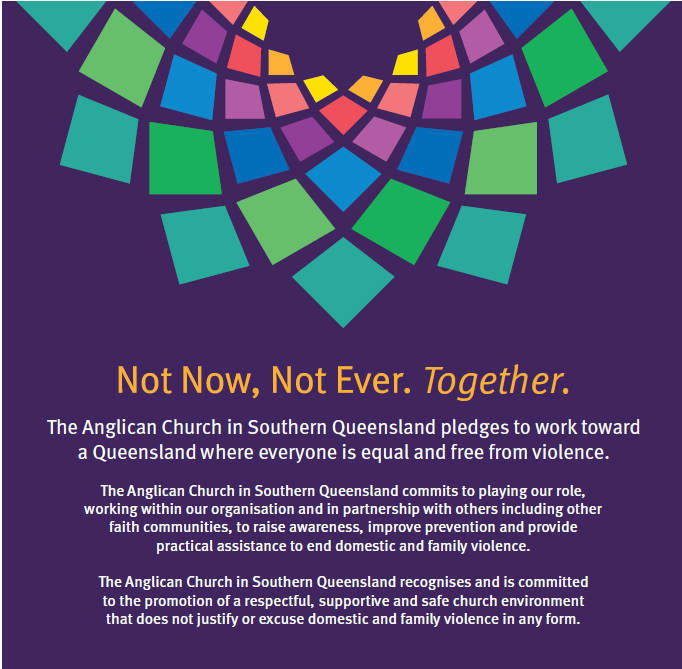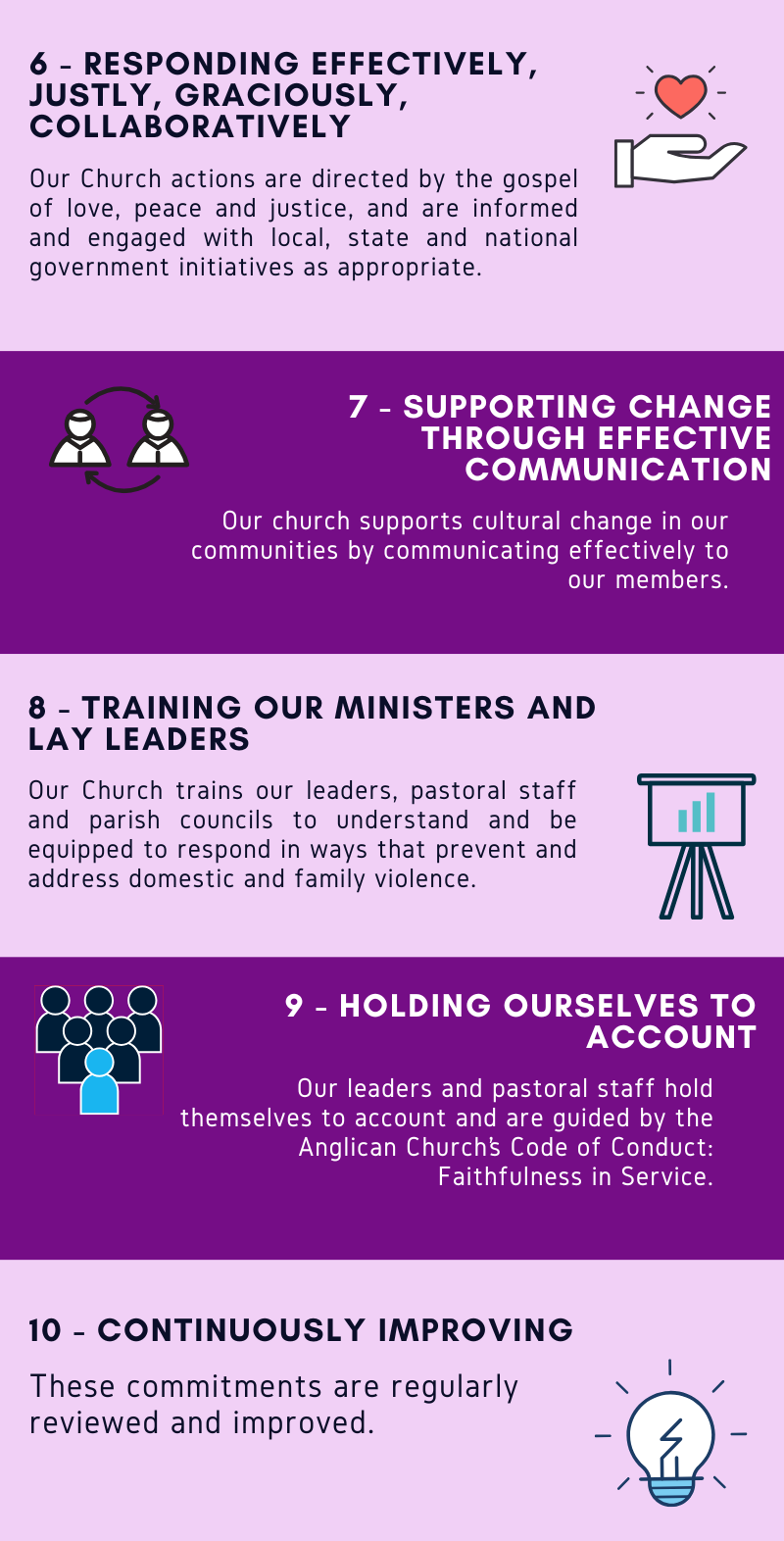
Domestic and Family Violence
Our Commitment to
Preventing and Responding to Domestic and Family Violence
The Anglican Church Southern Queensland (ACSQ) is committed to addressing the injustice of Domestic and Family Violence (DFV) within both the Anglican and broader communities. ACSQ has endorsed the Anglican Church of Australia’s Ten Commitments for Preventing and Responding to DFV and taken the Not Now, Not Ever. Together pledge at the 2024 Synod. Church leaders pledge to raise awareness, prevent violence, promote equity, and support those affected by DFV.
The Anglican Church of Southern Queensland recognises that Domestic and Family Violence disproportionately impacts vulnerable and marginalised groups, including women, First Nations peoples, culturally and linguistically diverse communities, people with disabilities, older adults, children, young people and LGBTIQA+ individuals. It also acknowledges the challenges faced by rural and remote communities in accessing support. ACSQ is dedicated to fostering safe and respectful environments that promote justice, peace, reconciliation, equality, dignity, and freedom from violence. What is Domestic and Family Violence?
Contact ACSQ Office of Safe Ministry
This form is intended for Anglican Church Southern Queensland clergy, church workers, and leadership seeking advice or support regarding DFV-related matters in their context. If you are a victim or survivor of domestic and family violence, we encourage you to contact your local clergy for pastoral support or reach out to emergency services and specialist DFV support services for immediate assistance.
Understanding Domestic and Family Violence
Domestic and family violence involves abusive, threatening, or coercive behaviour used to control or dominate another person. Coercive control is a form of domestic and family violence that involves an ongoing and persistent pattern of behaviour intended to undermine a person’s independence, confidence, sense of safety, or ability to seek help. This behaviour may involve control, intimidation, or actions that confine someone in an invisible cage of fear, leaving them feeling powerless and anxious for their own or their loved ones' safety and wellbeing.
Forms of Abusive Behaviour
Domestic and family violence can take many forms, including:
Physical or sexual abuse — such as hitting, pushing, strangulation, or unwanted sexual contact. This may also include forcing participation in unwanted practices.
Isolation and social abuse — such as isolating someone from family and friends, restricting their work or social activities, controlling their appearance, sabotaging social outings, or making accusations of affairs.
Emotional or psychological abuse — such as belittling, degrading comments, threats of suicide, or mind games that undermine confidence and self-worth.
Economic abuse — such as limiting access to money, demanding unreasonable financial control, or forcing someone to hand over funds, assets, or take out loans.
Threatening behaviour — such as using threats to force certain actions, including threats to harm children, pets, or others.
Verbal abuse — such as insults, name-calling, lying, or dominating conversations.
Stalking & Monitoring — such as excessive texts or calls, monitoring social media, driving past home or work, turning up unexpectedly, following someone in public, or vandalising property.
Technology-facilitated abuse — such as tracking someone’s location through devices, monitoring financial or personal accounts, or sharing intimate images online.
Spiritual abuse — Misusing scripture or religious beliefs to control, dominate, or harm; this may include demanding obedience through distorted teachings, preventing or forcing religious practices, using spiritual language to shame or manipulate, exploiting faith to silence victims, or isolating individuals within their faith community.
Litigation abuse — Misusing legal processes to control, intimidate, or harm a victim, often through excessive filings, false claims, or prolonged court proceedings.
Additionally, encouraging or directing someone else to engage in abusive, controlling, or violent behaviour towards a current or former partner is also considered domestic violence.
While domestic and family violence may occur as a single incident, it is often part of an ongoing pattern of abuse that causes victims to live in fear of their partner or former partner.
Domestic and Family Violence Working Group
Established and affirmed by the ACSQ Synod in 2019, the ACSQ Domestic and Family Violence Working Group aims to:
Raise awareness of domestic and family violence across the Diocese.
Develop policies and procedures to ensure best practice in supporting those impacted by DFV.
Provide accessible resources and information for those experiencing or supporting someone affected by DFV.
Offer education and training to clergy, staff, parishioners, and volunteers to improve awareness and support capabilities.
Act as a link between the ACSQ and the National Church DFV Working Group.
The Domestic and Family Violence Working Group includes members from across the Anglican community in Southern Queensland, representing:
clergy
parishes
schools
human services and broader support network
young people.
Not Now, Not Ever.
Together Pledge
The “Not Now, Not Ever. Together” pledge, a Queensland Domestic and Family Violence Prevention Council initiative, was signed by Archbishop Jeremy Greaves at the Anglican Church Southern Queensland’s (ACSQ’s) annual Synod meeting in Brisbane in 2024.
The Ten Commitments
Ten Commitments for Prevention and Response to Domestic and Family Violence in the Anglican Church of Australia.
DFV Links and Resources
National or Queensland Wide Services
-
There are several service finders available to help find community services and these can be very useful for people leaving violent relationships or to discover useful local services – here are a couple.
Ask Izzy is an app that connects people to a range of services.
Lady Musgrave Trust Handy Guide for Women. The Trust is Queensland’s oldest charity in Queensland and for many years has produced the Handy Guide for Women both in hard copy and online. The Guide also contains a lot of useful information on domestic and family violence.
Be There App – A domestic violence bystander support app. Produced through the Mate Program at Griffith University in Brisbane the “Be there” app is targeted at the bystander rather than people directly impacted by Domestic and Family Violence.
-
Queensland Churches Together Domestic Family Violence Resources
QCT sells a booklet “The Good The Bad and the Ugly” – Questions Women ask about Relationships and Christian Beliefs which is used extensively in Parishes to raise awareness of DFV.
The DFV Prevention Centre on the Gold Coast produces an excellent ebook; The Purple Book which provides lots of helpful information and service information.
On the Way Podcast - Jess Hill on Power, Control and Domestic Abuse - St John's Cathedral - 14 May 2023
Common Grace began in 2014 as a story of prayer and conversation with a focus on social justice. Their website has several resources specifically targeted on DFV.
Love and Power - Can the power of love replace the love of power? Rabbi Lord Jonathan Sacks, Templeton Prize 2016 - YouTube
Toxic Love Signs – Alison Baden Clay Foundation
Powerful stories from lived experience - Love does not equal Control Qld Government
Working with young people - Could your teenager be in an abusive relationship? Here’s what to do - ABC listen
Understanding domestic violence and Domestic Violence Orders is explained in these short videos in English, Aslan and a range of other languages. Videos on domestic violence court process | Queensland Courts
-
Responding to Domestic and Family Violence, Ridley Theological College in Melbourne. A free, self paced, online course targeted at Clergy but available to anyone seeking training grounded in Church environments
DV-alert has offered training in DFV for over a decade and offer a range of face to face and online courses. They have an excellent 2 hour, free introductory session for any person wanting to find out more about domestic abuse.
Queensland Churches Together (QCT) offers training especially targeted at Church communities




